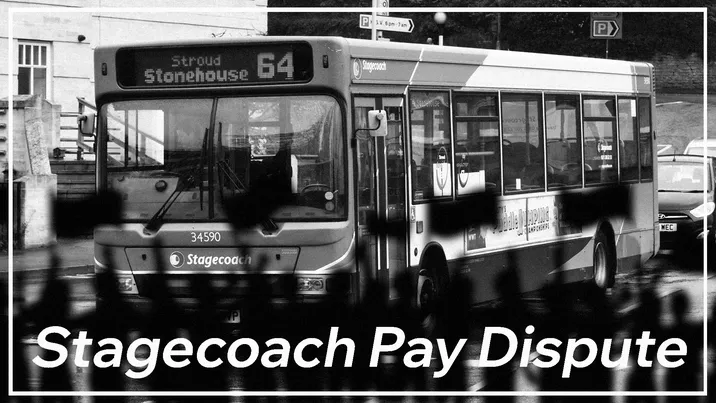At the wheel of the bus with heads unbowed: industrial action after Stagecoach pay negotiations break down

By George Thomas
Following the discovery that Stroud’s Stagecoach drivers are receiving a lower wage than their counterparts in Gloucester and Cheltenham, over 400 employees from across the South West have warned of strike action in solidarity.
Over 400 unionised Stagecoach employees across the South West have warned of strike action over demands for better terms of pay following the revelation that there are significant pay discrepancies between depots across the region. The discovery that Stroud staff are being paid less than their colleagues in neighbouring Gloucester and Cheltenham ignited a broader show of support from depots across the South West, who have come together to support Stroud’s drivers in their demand for parity of pay.
An initial offer made following the onset of talks in September between members of Unite and Stagecoach was dismissed out of hand. As negotiations continued through the following months a further two offers were taken to members of Unite, which were balloted and “resoundingly rejected” according to Unite’s South West regional officer, Shevaun Hunt. In conversation with Amplify Stroud, Hunt explained: “We’re talking about people who have worked tirelessly and continuously throughout the pandemic to support key workers getting to work and from A to B… now all we’re asking for is parity with people working the exact same job across Stagecoach West.”
Last year saw the passing of the drivers’ pay anniversary: the date after which terms of pay are open to renegotiation with Stagecoach West, a subsidiary of the national Stagecoach company (owners of local operators across the country as well as highly successful budget coach service, Megabus). While some depots came to agreements over their pay, Stroud’s drivers have yet to reach a conclusion that meets their demands. It is understood by Amplify Stroud that our local drivers receive roughly £10.50 an hour, while their colleagues in neighbouring depots are paid in excess of £11 an hour. This discrepancy, and Stagecoach’s apparent unwillingness to meet their employees’ demands, prompted five other depots – Cheltenham, Gloucester, Ross-on-Wye, Coalway and Bristol – to join Stroud in protest.
Only last week, an additional 70 drivers from the Stagecoach depot in Swindon made clear their intention to also ballot over strike action. It is understood that these drivers are paid in excess of £12 an hour, but they have decided to go to ballot in support of their worse-off colleagues in the original six depots. According to Hunt, this dispute has in fact bolstered Unite’s membership across the region, as other drivers have come to see this as an example of the power that exists in collective bargaining. “It would be easy for the depots to fragment and just worry about themselves. But they can see how unfair it is that you’ve got depots like Stroud being paid so much less… they’ve come together to say no to their employer.”
Stagecoach believe their proposals are fair, offering pay increases “of between 5% and 10%” on contracts lasting either one or two years. However, Hunt says that while each depot has received a different offer, for at least one of the six that went to ballot on January 25th this offer does not constitute a legitimate percentage pay rise as “it’s not consolidated onto the basic pay”. Instead, it is a “lump sum payment” presented as a percentage increase, by calculating its value relative to the existing salary.
This dispute is the latest of many occurring between Stagecoach and its employees up and down the country, in part due to workers’ pay anniversaries coming up at different times. But with the cost of living increasing by 5.4% last December (and with further increases anticipated in coming months), it is unsurprising that Stroud’s bus drivers aren’t satisfied with their employer’s offer when they know their co-workers in neighbouring towns get it better.
For their part, Stagecoach West have suggested that “any unnecessary disruption would set back the recovery of bus services and be a real kick in the teeth for local communities”. In a press release sent to Amplify, they stated that “the union has refused to demonstrate any flexibility around pay offers”, implying that it is obstinacy on the part of their drivers that is truly to blame for the breakdown in discussions and for any potential disruption. Rachel Geliamassi, Managing Director of Stagecoach West, said: “We really value our employees, who are doing a fantastic job under some challenging circumstances, and we agree that they deserve a good pay increase. This year has been a greater challenge, but despite this, we have still put forward strong pay offers of between 5-10% to recognise the valuable role our people play in our communities”.
However, Hunt believes that it is Stagecoach who have failed to play a constructive role in discussions: “The drivers’ aspiration has been consistent through this – they really feel that after four or five months of talks, they’ve been given no other option by their employer”. She added that she completely understood why the local community was concerned about the possibility of industrial action leading to a strike. “I absolutely do understand their concerns and so do our members. Nobody wants to go on strike. If it was easy and comfortable for everybody, we wouldn’t do it.”
Rather than casting blame, Stagecoach could instead see this as an opportunity for investment in a rural community for whom bus services are essential. According to their own figures, nationally Stagecoach had an “operating profit” of £58.4m in 2021, with £33.4m of profit being attributable to their shareholders. While these figures represent Stagecoach’s national intake, as opposed to Stagecoach West as an individual employer, with these numbers in mind it doesn’t seem unreasonable that our local bus drivers ask for a little extra to take home for themselves and their families.
For many Stroud residents, it is clear that our town is becoming increasingly expensive, with properties in Stroud town itself accumulating value after The Times designated it as the best place to live in the country last year. For some this is a great benefit, but for others it only heightens the importance of a functional bus service. Working people, as well as the young and elderly living further afield, require efficient transport in order to access the town’s amenities. With this in mind, it should be clear that we should show solidarity and support, rather than reproach, for drivers choosing to strike. Life isn’t getting any cheaper anytime soon for most of us and the same is true for the skilled professionals behind the wheels of our local buses. Collective bargaining and industrial action are two of the greatest tools available to us all.
At the time of writing it is unknown what the result of the ballots will be. The initial six depots finish collecting votes tomorrow (Thursday February 10th) and Swindon’s drivers on the 21st. Hunt explains that Stagecoach have reached out to her to continue discussions, but have not committed to talks on any of the dates she has provided. And with their three offers being rebuffed by Unite’s members, whose demands have remained clear and consistent, it would appear that the ball is in Stagecoach’s court when it comes to resolving the pay dispute. For now however, it seems they're ready instead to await tomorrow's result on the first round of balloting.
Whatever the outcome, this confrontation between Stagecoach and its employees seems indicative of the times; the disruption in the labour market caused by Covid-19 has shifted the foundations of the relationships between large businesses and their employees with a renewed tenacity on the part of unionised workers. For the rest of us, we are presented with an opportunity to support a change in the balance of power in our country’s economy. Rather than bemoan the demands of the underpaid and undervalued, we should all stand in solidarity with the people only months ago we called key workers and heroes.






Member discussion